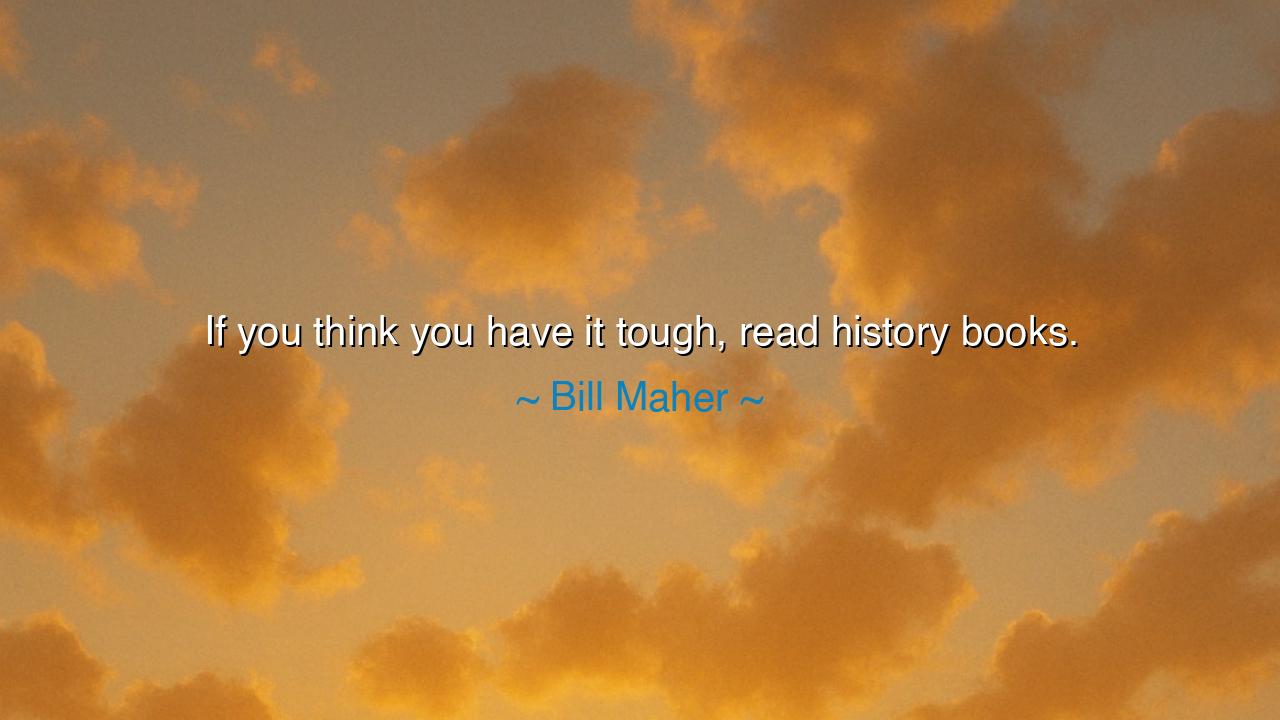
If you think you have it tough, read history books.






“If you think you have it tough, read history books.” — Bill Maher
Hear, O sons and daughters of comfort and struggle, the words of Bill Maher, the jester of modern reason and the sharp-tongued critic of complacency. Though clothed in humor, his saying strikes like a hammer upon the soul: “If you think you have it tough, read history books.” These words are not a mockery of pain, but a summons to perspective, a call to remember that human endurance has been tested far beyond the bounds of what most now imagine. He speaks to a generation that feels its burdens heavy but has forgotten the full weight of what came before — the famine, the plague, the sword, the chains.
The origin of this saying lies not in the classroom nor the scholar’s pen, but in the spirit of satire that seeks to awaken rather than merely to amuse. Maher, ever a commentator on the follies of his time, reminds his listeners that hardship, though real, is not unique to them. His humor conceals an ancient wisdom: that to read history is to meet the ghosts of those who suffered before us — and in meeting them, to discover gratitude. When the heart is burdened with complaint, history becomes the mirror that reflects both the strength of humanity and the smallness of our modern despair.
Consider, for example, the blackened winter of Valley Forge, where General George Washington and his soldiers stood barefoot in snow, starving, their bodies wrapped in rags, their cause hanging by a thread. They did not have comfort, nor certainty, nor even shoes. Yet from that frozen suffering rose the fire of a revolution that would change the destiny of nations. Or think of the London Blitz, when families huddled in darkness as bombs fell from the sky, their city in flames, their hearts steady in defiance. These people knew what it meant to have it tough — and yet they endured.
To read history, then, is to awaken humility. It teaches that we are the heirs of survival. Every freedom we now enjoy, every comfort, was paid for by generations who endured what we cannot imagine. The plagues of the Middle Ages, the slavery of empires, the wars that devoured millions — all these are chapters written in blood and tears, and still, humanity rose again. When Maher speaks, his jest conceals a challenge: to measure our suffering against the river of human struggle, and to see that we are not alone in pain, but part of a lineage of endurance.
Yet his words also hold a subtle warning. For when people forget the past, they lose both gratitude and strength. The comforts of the present can soften the will, make the heart fragile, and blind the soul to what real hardship means. In forgetting history, we risk mistaking inconvenience for tragedy, discomfort for oppression. The ancients knew this well: that memory is the backbone of courage. Those who remember what has been endured before them do not crumble easily. They walk with the quiet confidence of those who know their ancestors survived worse.
Think, too, of the story of Anne Frank, whose diary, written in hiding from the terror of war, remains one of humanity’s most luminous testaments. She lived in fear and darkness, yet wrote of hope, of beauty, of goodness still dwelling in the human heart. To read her words is to feel the pulse of the past, and to realize how vast the human spirit can be even when crushed by cruelty. Her story, like countless others in history’s pages, reveals that though life can be harsh, the soul can remain unconquered.
So take this teaching to heart, O reader of the modern age: when you think you have it tough, turn to history. Let the stories of those who came before you give you strength. Let them humble your complaints and kindle your courage. Remember that the world you inhabit — of medicine, abundance, freedom, and choice — is built upon the bones and dreams of those who had far less. Their pain became your inheritance; their endurance, your privilege. Do not waste it in despair. Instead, rise as they did, fortified by gratitude and wisdom, knowing that you, too, are part of the same unbroken story — the story of humanity that endures, learns, and lives again.






AAdministratorAdministrator
Welcome, honored guests. Please leave a comment, we will respond soon